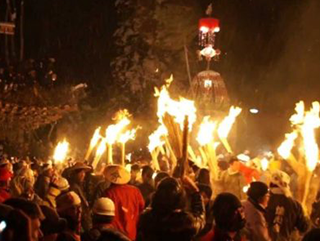Discover the rich history and vibrant celebrations of Bugum Chugu, Ghana’s Fire Festival, uniting communities in the Northern, Upper East, and Upper West Regions through torch-lit rituals and cultural heritage.
Introduction
In the heart of Ghana’s Northern, Upper East, and Upper West Regions, a luminous spectacle unfolds annually—the Bugum Chugu, or Fire Festival. This ancient celebration, marked by torch-lit processions, drumming, and communal rituals, serves as both a historical commemoration and a vibrant expression of cultural identity. Rooted in tales of lost royalty and spiritual beliefs, the festival transcends generations, uniting diverse communities in a shared heritage. As flames pierce the night sky, participants honor their ancestors, seek blessings, and reinforce communal bonds. Join us as we delve into the origins, evolution, and enduring significance of the Bugum Chugu, a festival that continues to ignite the spirit of unity and tradition in Ghana.
Early Background / Origins
The Lost Prince and the Birth of the Fire Festival
The origins of Bugum Chugu trace back to a poignant legend among the Dagomba people. According to oral history, during the reign of Naa Zoligu, the 7th Yaa-Naa of Dagbon (circa 1469–1486), his grandson, Naa Dariʒiɛɣu, went missing in the bush. Believed to have been taken by supernatural beings, the community embarked on a nocturnal search, lighting torches to illuminate their path. Upon finding the child asleep under a tree, they burned the tree, suspecting it of harboring evil spirits. This act of torching the tree became a symbolic ritual, giving birth to the annual Fire Festival. [1]
Alternative Narratives
Some Muslim Dagombas attribute the festival’s origin to the time of Prophet Noah. In this narrative, after the flood, torches were lit to search for Noah’s missing son. However, this version is less widely accepted and is considered a later adaptation to align the festival with Islamic traditions. [2]
Rise / Development
Expansion Across Regions
Originally celebrated by the Dagomba, Bugum Chugu has been embraced by neighboring ethnic groups, including the Mamprusi, Gonja, Nanumba, and others in Ghana’s northern regions. Each community incorporates its unique customs, enriching the festival’s diversity. [3]
Preparations and Rituals
Preparations commence with the collection of dry grass to make torches. Children often gather these materials, distributing them to elders, who, in turn, offer blessings or tokens of appreciation. The festival begins on the ninth day of the traditional month of Bugum Gɔri, aligning with the lunar calendar. [4]
The Night of Fire
After evening meals, communities gather, and the chief ignites the first torch, symbolizing leadership and unity. Participants then light their torches and proceed through the town, singing traditional songs like “Yoo Yoo Yoo Yaa Yoo,” dancing the ziem, and sometimes firing muskets. The procession culminates at a designated tree, where torches are thrown, reenacting the original legend. [1]
Achievements / Importance
Cultural Significance
Bugum Chugu serves as a vibrant expression of cultural identity, preserving ancient traditions and fostering intergenerational connections. The festival’s rituals, music, and dances are vital in maintaining the cultural fabric of the communities.
Social Cohesion
The festival reinforces communal bonds, bringing together individuals from various backgrounds to participate in shared rituals and celebrations. It also provides an opportunity for reconciliation and the strengthening of social ties.
Spiritual and Religious Aspects
While rooted in traditional beliefs, Bugum Chugu has incorporated Islamic elements over time. Prayers are offered, and holy water, known as waliga, is prepared using Quranic verses, believed to purify and protect participants. [1]
Challenges / Controversies
Modernization and Urbanization
As urbanization increases, traditional practices face challenges in adapting to contemporary settings. Safety concerns arise from the use of fire and firearms, leading to calls for regulated celebrations.
Cultural Preservation
Younger generations may be less engaged with traditional customs, risking the dilution of cultural heritage. Efforts are needed to educate and involve youth in the festival’s significance.
Legacy / Modern Relevance
Tourism and Economic Impact
Bugum Chugu attracts tourists, boosting local economies and promoting cultural tourism. The festival’s unique rituals and vibrant displays offer visitors an immersive cultural experience.
Educational Opportunities
The festival serves as a living classroom, offering insights into Ghana’s rich cultural tapestry. Educational programs can leverage the festival to teach history, anthropology, and cultural studies.
Conclusion
Bugum Chugu stands as a testament to the enduring spirit of Ghana’s northern communities. Through torch-lit processions, rhythmic dances, and communal rituals, the festival encapsulates a rich tapestry of history, spirituality, and cultural pride. As it continues to evolve, Bugum Chugu remains a beacon of unity, illuminating the path of tradition in the modern world.
FAQs
Q1: When is Bugum Chugu celebrated?
A1: Bugum Chugu is celebrated on the ninth day of the traditional month of Bugum Gɔri, which aligns with the lunar calendar. The exact date varies each year, typically falling in August, September, or October.
Q2.What is the Bugum Chugu (Fire Festival)?
A2.Bugum Chugu, also known as the Fire Festival, is a traditional festival celebrated primarily by the Dagombas, Mamprusis, and Nanumbas. It commemorates the legendary search for a lost prince using torches and symbolizes spiritual cleansing.
3. What are the main activities during the Bugum Festival?
The festival features the lighting and procession of fire torches, gun firing, drumming, traditional dancing, and chanting. Community members walk through their towns and villages with flames to chase away evil spirits.
What is the significance of the torches in the Bugum Festival?
The torches represent the ancient search party that looked for a missing prince. Today, they symbolize light overcoming darkness and serve as spiritual protection for the community.
5. Can outsiders or tourists join the Bugum Festival?
Yes, visitors are welcome. However, because the festival includes night processions, loud gunfire, and sacred rituals, it’s important to attend with a local guide or observe community protocols respectfully.
Citations:
Ghana’s North East Region: northeastghana.com/fire-festival/?utm_source=chatgpt.com
dagbonkingdom.com: dagbonkingdom.com/bugum-chugu-history-of-the-fire-festival/?utm_source=chatgpt.com
Wikipedia: en.wikipedia.org/wiki/Bugum_Chugu?utm_source=chatgpt.com
Modern Ghana: www.modernghana.com/news/651380/northern-region-celebrate-annual-fire-festival.html?utm_source=chatgpt.com



